Workers and government ministers alike had feared, even expected it. But when giant French car manufacturer PSA Peugeot Citroën announced it was axing 8,000 jobs in France and closing its plant at Aulnay-sous-Bois on the edge of Paris the news still fell like a bombshell. For workers in some of the country's most deprived areas it means redundancy at a time of high unemployment in France and continuing gloom over the French and European economies. For François Hollande's new socialist government it is the first major social test of its promise to bring “change” to the country and his pledge to focus on jobs and economic growth rather than austerity.
Hollande described the cuts as “unacceptable” and called on PSA Peugeot to renegotiate its plans. Other government ministers were also quick to attack Peugeot's cuts and unveiled plans to help the country's ailing automobile sector. Meanwhile union leaders described the announcement as a “declaration of war”.
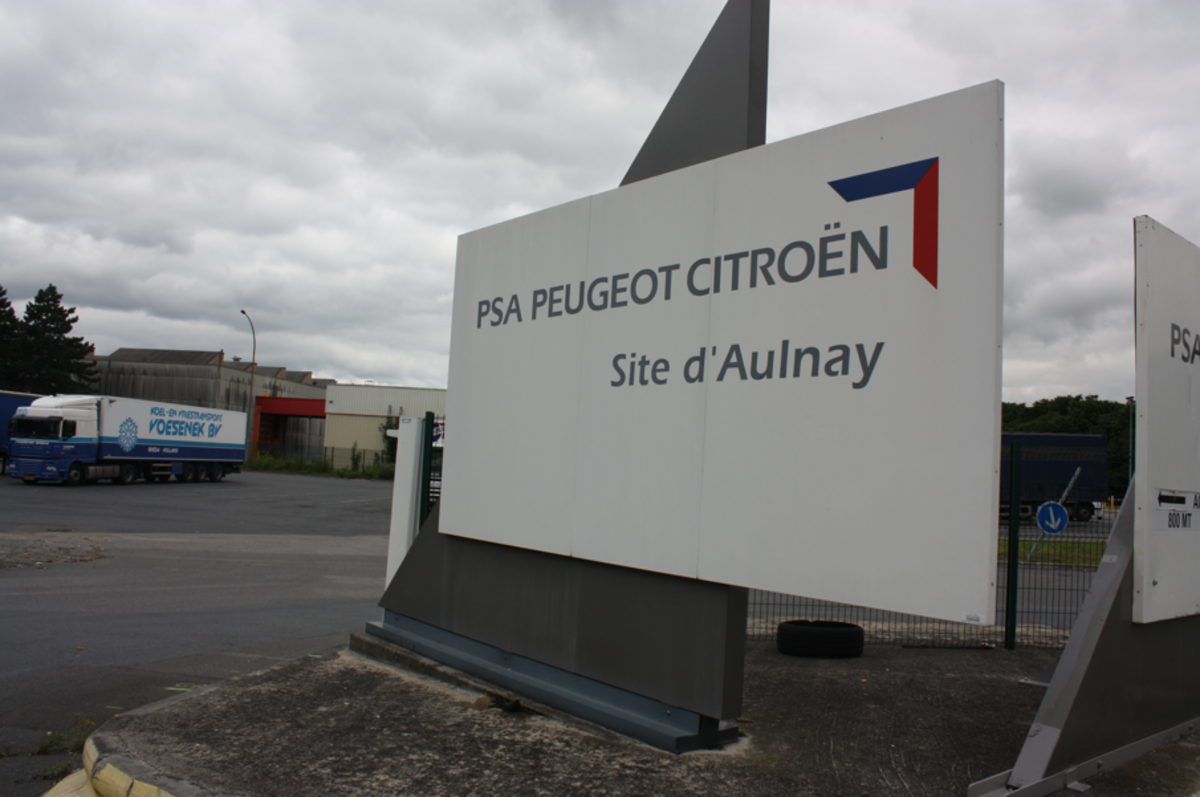
Enlargement : Illustration 1

However, anger has also been directed at Hollande and his government over their failure to do more to help the workers. Ahmed Berrazzel, one of the leaders of the militant Confédération générale du travail (CGT) trade union, said the president had personally promised him he would prevent the closure. “The day of the televised debate [between Hollande and Nicolas Sarkozy on May 2nd] between the two two rounds of voting Hollande told me, in so many words, 'If the French people choose me I will stop Peugeot from closing the factory and I will meet you',” said Berrazzel.
“He has done nothing. The factory is closing and he hasn't met us.”
And there were angry scenes when the socialist mayor of Aulnay-sous-Bois, Gérard Segura, tried to address workers after news of the closure was announced. “We got rid of the Right to put you in power, we all voted for Hollande,” Samir, a young worker and union militant interviewed at length earlier by Mediapart (see below) told him.
“He promised us 'Change, it's now' and today he bows his knees before PSA Peugeot. He lied to us. The Left, in fact, is worse than Sarko!”
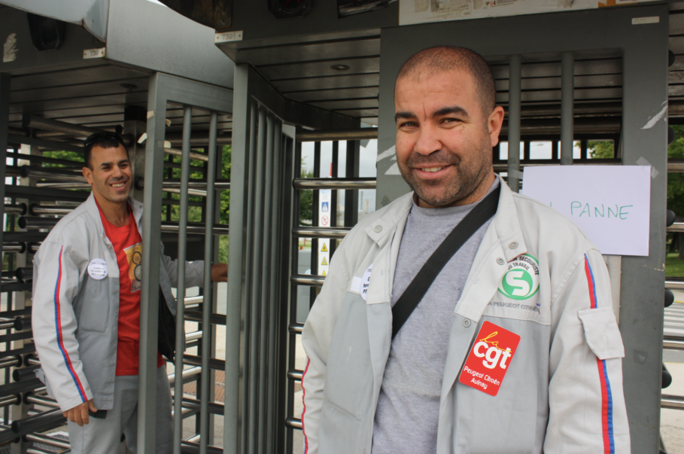
Enlargement : Illustration 2

The closure of the factory at Aulnay, where 3,000 full-time workers and 300 temporary staff are employed, is the most high-profile of the cuts announced by Peugeot which employs 100,000 people in France, but which is trying to make savings of a billion euros after facing losses of around 700 million euros in the first half of 2012.
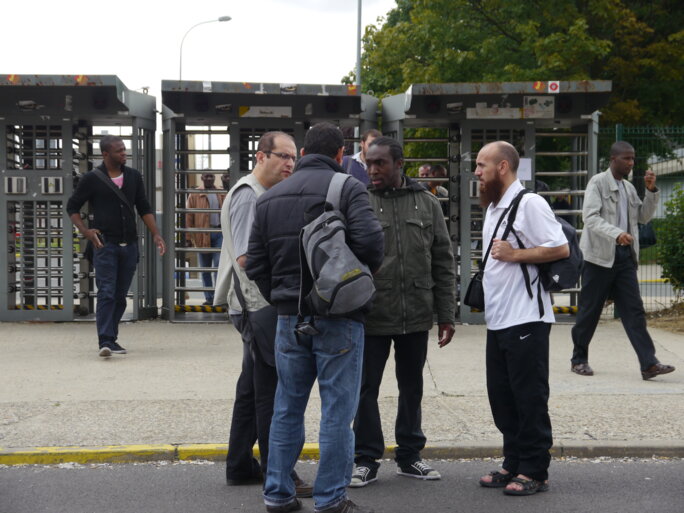
Enlargement : Illustration 3

Mediapart went to Aulnay to interview workers at the factory.
'We are going to be PSA and the government's nightmare.'
Some words are taboo at PSA Peugeot Citroën. Managers never use words such as “lay off” or “closure”. Instead, they prefer “external mobility” or “progressive decrease in activity”. But the 3,000 staff and 300 workers on short-term contracts at the PSA plant in Aulnay-sous-Bois, on the outskirts of Paris, are well-versed in this jargon. They clearly understood the announcement made on July 12th during an emergency works council meeting: the Aulnay plant is scheduled to close in 2014. A further 1,400 positions will be slashed in its plant in Rennes in north-west France.
The workers at Aulnay have been preparing to lose their jobs for the past year. Ever since the CGT union revealed an internal memo detailing a site closure in 2014. Confirmed by other documents revealed by Mediapart, the workers waited for the time bomb to detonate.
If their plant closes, it is the entire area that will suffer. The Seine-Saint-Denis department is among the poorest and has the largest youth population in France, hundreds of whom live in the Cité des 3000, a dilapidated subsidised housing estate built in the 1960s, located just a few kilometres away.
The unions, who have not shown such a united front in months, are “ready for a fight”. They called for a strike on Thursday, the day of the announcement, and for a rally, for early afternoon, of blue - and white-collar workers, of technicians and of managers on the huge parking lot in front of Gate 3 – the employee entrance to the factory. "We are going to be PSA and the government's nightmare. The Continentals [1] are nothing next to us," warns Ahmed Berrazzel, who as well as being a leading figure in the CGT also comes from the local deprived estates.
"This is it. D-day has arrived," adds Jean-Pierre Mercier, a fifteen-year PSA veteran. A leader of the "reds," a CGT representative on PSA's group works council and the former spokesperson for Trotskyite presidential candidate Nathalie Arthaud, he is glad to join forces with the other unions, including the very right-leaning SIA, the in-house union close to management, led by a woman, Tanja Sussest.
The main employer in the vicinity, the PSA plant at Aulnay opened in 1973, when the industrial future of France was still bright. Those were the days of the Trente Glorieuses, the thirty years of robust economic growth that followed the Second World War. It was also a time when massive numbers of immigrants from France's former colonies in North Africa – Algeria, Morocco and Tunisia – were recruited to work on the assembly lines producing millions of vehicles. Their children, who were born in France, subsequently took over, and then came the decline of the French automobile sector and endless crisis. The Arab-black-white-Asian social make-up of the plant, so apparent when the workforce leaves the factory gate, also tells the history of these suburban housing estates.
Mediapart met with the workers of the Aulnay plant that produces both cars "and disabled workers", union members point out. Those who agreed to speak on the record were often members of the CGT or SUD trade unions and are of North Africa origin, as are most of the workers. Non-union employees; members of the in-house union, the SIA; the “whites” who sometimes commute from as far away as Picardie several hundred kilometres distant; but also the most recently hired – the Africans, the Indians, the Pakistanis or Chinese – generally declined interviews and went on their way, keeping their heads down.
All are worried, oscillating between fatalism and pugnacity, and are exhausted by months of internal strife and uncertainty about their professional future. "That's all we think about every day, every night. There's a lot of depression," says 32-year old Najim, the father of two children with a few loans to pay off and "the fear of unemployment". He is from one of the largest estates in the region, "where there is no work," he adds. "This factory is our life. We love it," explains M'Barek Harfaoui, an old-timer who immigrated from Morocco and was hired in 1975. He is one of the last remaining living memories of the plant's history. The average age on the shop floor is about 30-35.
The following are portraits of people met at the metal turnstile of Gate 3 as the night shift was coming on at 2:37pm and a swarm of buses zoomed about taking the day shift home.
--------------------------
1: The Continental tyre plant at Clairoix was closed in 2009 after years of draconian restructuring plans. In a series of high-profile protests the workers gained national attention to their cause and became a symbol of the fight against globalisation.
M'Barek, aged 60: 'France creates the ghettos. Not us.'
"You spend 38 years with the firm and you leave like this. It's death row." M'Barek Harfaoui turns away to wipe the tear forming in one of the crow's feet around his eyes. He thought he could handle the interview, standing straight in the middle of the deserted parking lot, stoic in his mismatched suit. But he broke down when it came time to get back into his car. Recalling his four decades behind the walls of the PSA plant in Aulnay meant opening old wounds. It meant going back to the era when North Africa was decolonised, when France needed manpower, when factories sent government subsidised doctors to Tunis or Casablanca in order to recruit as much cheap labour as they could find.
Known as "Harfaoui" or "the Red from Goulimine", this nomad from the desert of Morocco is one of the last veterans of that epoch, one of the thousand faces of the first wave of North African immigrants, the majority of Aulnay workers from 1973 to the early 2000s."We're just a dozen left in the plant. They're all gone," he says counting off on his fingers, his eyes hidden behind thick glasses.
He was 23 when he left his mother and Goulimine for the Paris region. That was in 1975. A French doctor had just declared him fit to help reconstruct France. Acquired over the years, his French is impeccable with only a twinge of the accent of the "chibani" [elder in Arabic] as he narrates what he calls "the test".
"The governors of the different provinces called for volunteers to help France. Given the poverty, there were thousands of us who came down from the mountains. You had to be between 18 and 25 years old. We were like chattel, naked, lined-up one behind the other. A doctor came down the line, stopping at the more muscular, looked especially at their hands and their legs, then he would put a stamp on you, like a bull, if he selected you. Those who were aged forty or fifteen tried to get through. Some made it but once on the other side, their health was ruined," he says.
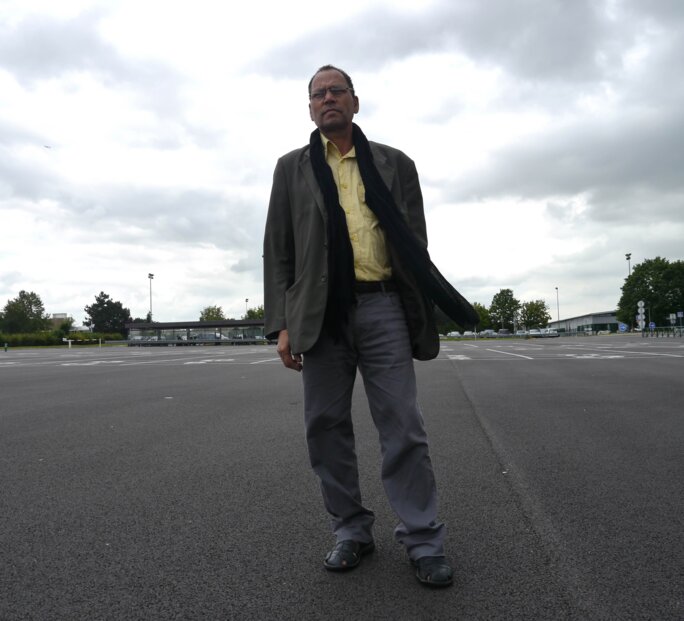
Enlargement : Illustration 4

M'Barek "dreamed of France". He crossed the Straits of Gibraltar "to be free", he explains. He did not know that he was walking "into prison" at Peugeot. He was also far from imagining himself as a trade union activist, as the sworn enemy of the "global bourgeoisie" and of shareholders. In the early years, he kept his head down, ignored the racist jokes, put up with the gruelling pace, as did all the "brothers" [North Africans]. "The pressure was huge. The factory operated at full capacity. We didn't even have the right to talk to each other. If you reacted, the boss threatened to send you back to Hassen II [then King of Morocco]. In general, the unit or group supervisors were former colonists. Management recruited them on purpose because they spoke Arabic and knew how to bring the 'wogs' ['bougnoules' in French] to heel. That's why they never called us 'Monsieur'," he recalls.
In 1979, with about fifteen fellow workers, he secretly joined the CGT union in his department. That was the first step towards the major strike, in the spring of 1982, initiated by immigrants fed up with their "slave status". In Aulnay, M'Barek was one of the leaders of the revolt. "We had no experience. We didn't know what 'strike' meant but we were determined to regain our dignity," he says. They demanded trade union rights, a salary increase of 500 francs [€76] and "the end of the Ricard" [well-known brand of aniseed-based alcohol], this humiliation that M'Barek cannot bring himself to forgive.
"To get a day off or to obtain a less arduous post because you couldn't keep standing any more," he explains, "you had to give a bottle of Ricard to the bosses. They knew we were Muslim and that our religion forbade us to touch a bottle of alcohol."
That was only the first battle, others would follow over the years. One after the other M'Barek lists the struggles: from the first massive lay-offs in his career – 800 sacked in 1984 – that decimated the CGT section in favour of the CSL [now SIA, the in-house union] – to the social tempest brewing with the announcement of the closure of the Aulnay site. "Since 2002 and the arrival of Philippe [Julien] and Jean-Pierre [Mercier], the CGT has done some good work against discrimination. They forced PSA to hire local youths," he says.
At the end of the month, he was supposed to go on holiday. "Given the work to do at the plant", he says he is cancelling his annual trip to his native Sahara. Back there, "everybody dreams of a visa for France, even if you explain to them that they are wrong", he says. But he tells them "nothing". His family does not know about this feeling of "being always inferior to the others, the real French”. They don't know that he is ending his career as an assembly line operator with a take home pay of 1,650 euros net per month after 38 years of labour.
At 60, he could have stopped work, he explains, if former president Nicolas Sarkozy “had not left with his retirement” [1]. But the "worn-out robot" has to hang on for another two years. Diabetic, plagued with musculoskeletal disorders, he "endures work and life which is harder and harder and more and more expensive". He no longer lives in the Cité des 4000 estate in the northern Paris suburb of la Courneuve, so notorious it is called “Chicago” [in reference to Al Capone and the city's gun-toting, prohibition past]. He and his wife, who joined him in 1984, now live in subsidised housing in Carrières-sur-Seine in "a quiet three-story building".
Their six children, born in Morocco or France, are now grown up. M'Barek would have liked the five boys "to take the path to higher education but they adopted the [ghetto] mentality of the estates," he coughs and lowers his arms. "It's not their fault. France creates the ghettos. Not us," he adds. It hurts him to see that despite all the battles fought, immigrants are still stigmatised, victims of a "more devious, more ordinary" racism.
"Today, PSA exploits waves of immigrants: the Zairians, the Congolese, the Hindus, the Chinese. The weak have changed nationality. Before it was us, the Arabs and before us the Italians," he notes with disgust. During the previous presidency, he stopped buying the newspaper because "everything was heaped on us", he adds. Disappointed by the Left, by political leaders in general, he says he does not believe that elections, be they presidential or legislative, can improve the lives of the workers. "Only the street can do that".
----------------------------
1: In 2010, despite strong opposition from the unions, the government under president Nicolas Sarkozy changed the legal retirement age from 60 to 62. President Hollande's government is to reinstate retirement at 60 for certain workers who began work at an early age.
Samir, aged 32: 'Seriously, where are we going to go?'
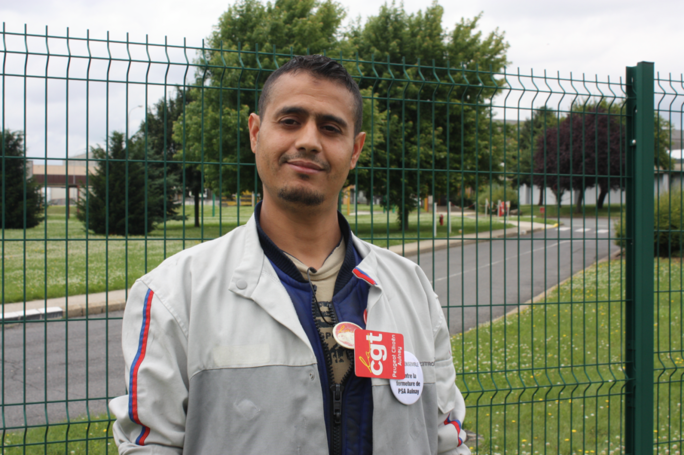
Enlargement : Illustration 5

Samir was 19 years old when he first walked onto the tarmac of the parking lot of the Aulnay plant. “At the time a group of us left Nord-Pas-de-Calais [in the north of the country],” he explains twelve years later in the same parking area. "Up there, there was no work, they had closed the mines, so we came to work in Paris," he explains, "and now, they tell us there is no work in Paris. But seriously, where are we going to go? We have friends around here, they are all unemployed."
After starting at PSA as a temporary worker "like just about everybody," the young man has never left the assembly line which he talks about in a mechanical manner. "I'm an operator, that means that I assemble pieces onto car bodies at a furious pace. I worked three years before getting a permanent contract. At first it was a bit of a hassle," he says.
Staying on friends' sofas, then in a little studio flat, Samir lived in various places until he got married and started renting a two-room flat in Argenteuil, a suburb northwest of Paris. With a pay packet of 1,400 euros a month net “that never changes” he says he finds it hard to make ends meet. “My wife and I are always overdrawn,” he says. “Life is expensive, it's not easy to get by.” But when he thinks about some of his workmates, Samir considers himself well off. “There's a lot of them who can't find a flat and who sleep in their car, in the factory car park.”
A member of the CGT, Samir proudly shows his union card, which allows him to join with “people who are determined and who will fight till the last drop of blood,” he says, swelling with pride. It's also the mark of those whom “the bosses want to destroy”. He says: “The management attacks us with every possible means. Me and other colleagues have just received a summons for having, they say, damaged public property during a protest in 2010 at the Grande Armée [the name of the street where Peugeot have their headquarters in Paris and where hundreds of protesters demonstrated against the closure of the company site at Melun-Sénart in the Seine-et-Marne department east of Paris– editor's note]. As if it was just by chance they are digging up old cases right now.”
Samir recalls other examples of “intimidation”. He remembers in particular a dispute with a senior figure in the company four years ago. “He called me a 'wog' [the French word used was 'bougnole' – editor's note] and I reported him but it was his word against mine. So it was he who won. Now the racism has changed – it's aimed at the unions.”
The power struggle which has built up between the unions and management has given him the strength to “see out the struggle right to the end”. He wants to fight “whatever the cost”. For his sake and for his colleagues but also for the sake of his five-year-old son. “We've built a life here, a little cocoon. They have worked us and wrecked us on the production lines, and now they want to get rid of us? No way,” says Samir. Suffering from tendinitis “a problem that will never be cured”, Samir is one of the many victims lines of the assembly line. “They have piled up the workload on staff, it has become very tough,” he says. “And yet we continue to work 100%.”
Convinced that no other factory would take on “all these people in their thirties that PSA Peugeot has left handicapped for life”, the young worker finds it hard to look ahead and make plans for the future. “I left school at nine because, for me, in my mind, I just didn’t get the hang of it. My brothers and sisters, they all finished their studies and me I am the … practical one in the family. I am not a theoretician, I've always worked on the assembly line. So I'll think I'll end up as an employee, a fighter, battling it out.”
Determination, fight, combat and struggle are words that regularly punctuate Samir's speech. “My aim is a revolution. I see beyond this dispute. [The job losses at] Doux, Continental, there are closures everywhere. The bosses have made themselves wealthy in France and now they want to make themselves rich elsewhere. It can't go on like this.”
Najim and Farid, aged 32 and 35. 'We're looked upon as slaves.'

Enlargement : Illustration 6
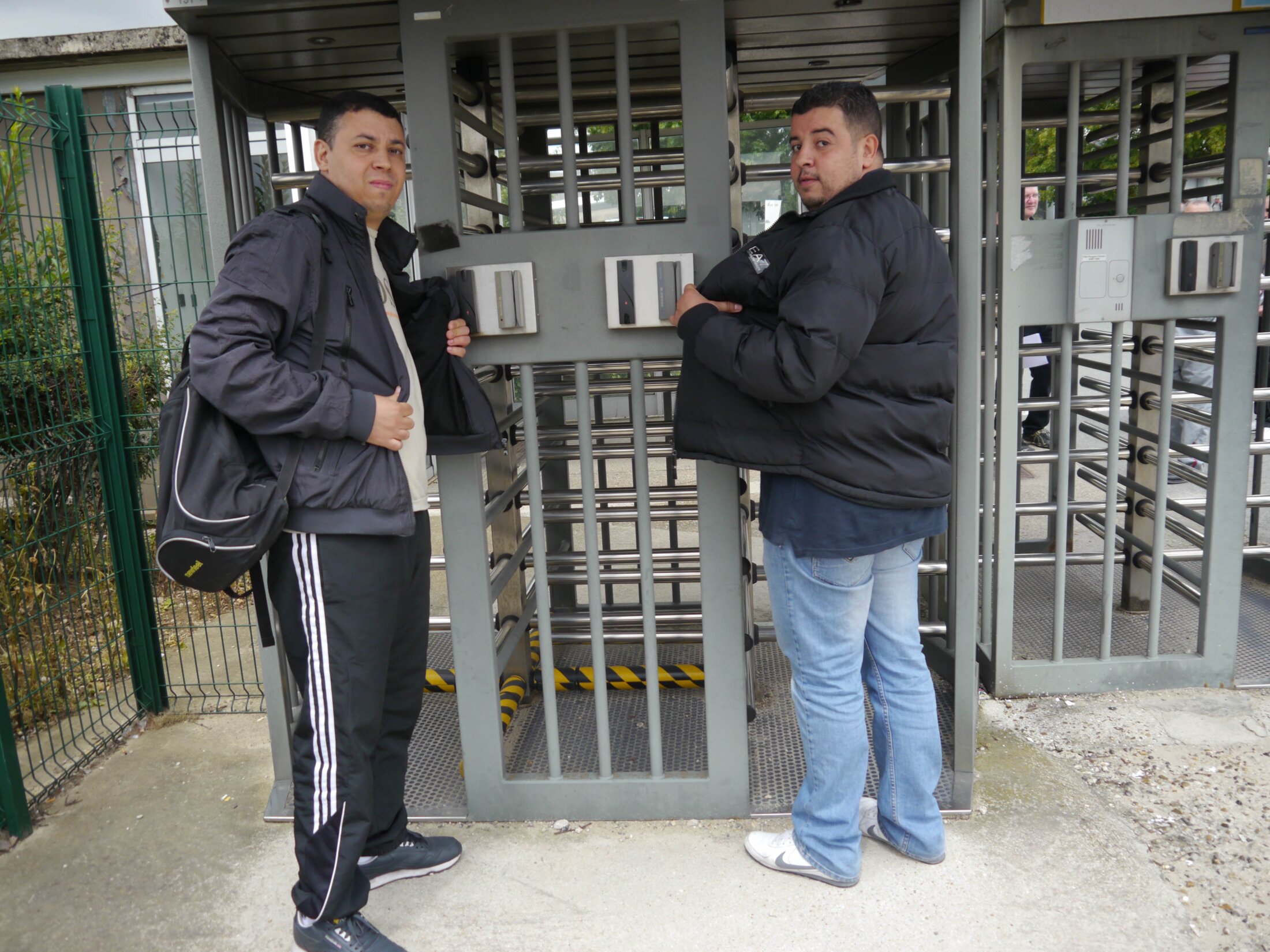
Najim and Farid swore they'd never follow in their family's footsteps. The sons of workers in factories and the building trade, they did all they could to avoid the factory, the assembly line, the “work that should not exist in 2012 because it damages people so much”. But in vain. The only permanent job they could find was as a metal worker on the assembly line at PSA Aulnay. The factory is more than an hour's bus journey from the social housing estates where they live, the Clos-des-Rose and Les Victoires, two of the main working class areas devastated by unemployment at Compiègne in the Oise department north of Paris.
Having little option, they signed up promising to “avenge” their grandparents, parents and cousins. Those were the “chibanis” or “elders” who came over from the Atlas mountains in Morocco in the 1970s, speaking not a word of French, having to endure the situation, putting up with the racist jokes of the bosses and, very occasionally, managing to climb up the ranks in the factories. Farid was taken on in 1999 and Najim in 2001 when they had nothing to do on their housing estates. They were aged 20 and “in great shape”.
Ten years on they are very bitter, their youthful illusions far behind them and their health is already suffering, “especially our backs”. Farid and Najim, both now fathers, still earn 1,460 euros net a month and continue to assemble car doors, and feel doomed to remain assembly line operators. “Nothing's changed since our parents' day. There's still discrimination. They don't trust the second generation [of immigrant families] and still less the third generation. We're looked upon as slaves,” says Farid, who is a member of the CGT like “quite a lot of the brothers”.
Every year the two friends see “white” colleagues who had been taken on well after them being promoted ahead of them, even though they don't have the seniority, the experience nor the qualifications to justify it. “The worse thing is that we trained them and then, the following day, they are giving us orders,” says Najim, who has refused to join a union. When they dare to “open their mouth” they are curtly told : “Think yourselves lucky! Your parents were on 1,500 francs [1] a month.”
However, Farid had once believed he could rise higher. When the night shift still existed he asked to join it. Six nights out of seven he put up with the constant insults and hoped at the end of this difficult time that he would get “a reward”. But he was bitterly disappointed. “All I got was a disability card!” he says angrily. “Not even a small bonus, not the slightest promotion.” He cannot forgive the management for having preferred to recruit workers from far away rather than from the poor suburbs of the Seine-Saint-Denis department where the factory is located.
“They have brought in whites from hundreds of kilometres away when all they had to do was cross the road to go to the Cité des 3,000 [housing estate in Aulnay-sous-Bois],” he says. The CGT union, which has been very combative on the issue of discrimination, and whose name is cited by the majority of workers of North African origin, worked with another trade union, Sud, to reverse this trend. “Things have changed a bit,” says Najim. “They've realised that children born into diversity will not let things go as their elders did, but the old clichés remain,” he adds, pointing to the factory entrance.
It is 2.32pm and in five minutes he will start his shift with Farid. It will involve seven hours and 56 minutes of work up to 10.28pm, interrupted by a half-hour meal break and two other seven-minute breaks to go to the toilet or smoke a cigarette. By the time they return home their children will be in bed. It will be midnight.
Dominique, aged 46: 'I'm working on a model that has more of a future than me...'
Standing in front of Gate 3, Dominique is chatting with a colleague while checking out of the corner of his eye to make sure his bus to Aubervilliers, in the north-east suburbs of Paris, doesn't leave without him. An employee at Peugeot for 22 years, he was an assembly line overseer for several years before working on plans for the Citroën C2 then the C3. “At the moment it's quite funny, well in one way, because I'm working on the development of the new C3 that will come out next year,” he says. “Basically, I'm working on a model that has more of a future than me...”

Enlargement : Illustration 7
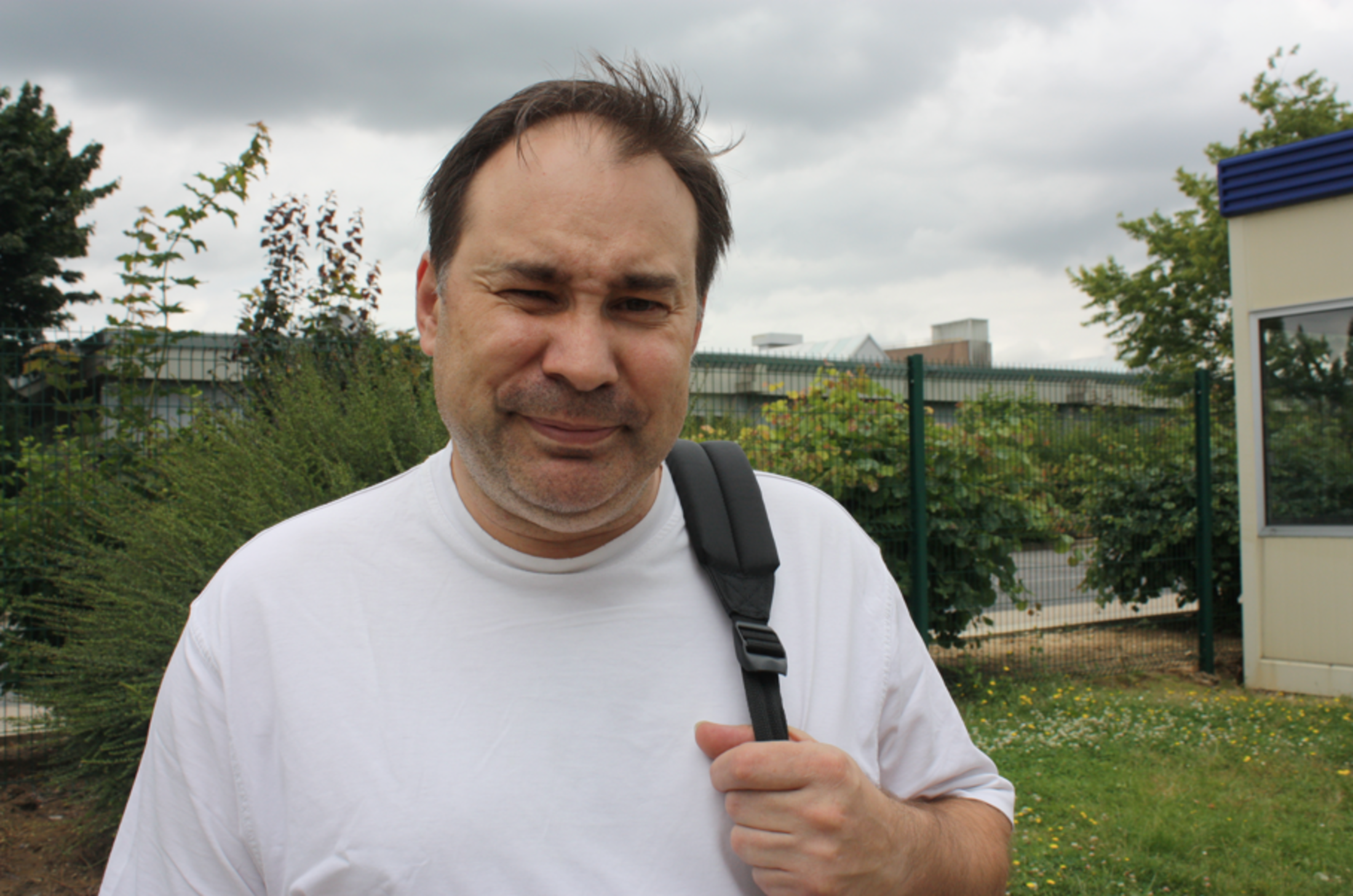
Dominique considers himself happy. Taking into account his earnings of 1,800 euros a month net, his wife's “decent” salary, and having “no children or borrowings” he manages “quite well”. He says: “Essentially my job is to bring the parts and to make sure that the assembly line operators can mount them without any problem. I like it. I meet the operators, the technicians, the bosses, I go just about everywhere in the factory, it's rewarding.”
However, he accepts he is faced with “uncertainty like the others” over the future. “People are coming to work with knots in their stomach because they don't know what's to become of them. There is a deep depression inside the factory.”
Even more than over the length of time it has taken to reach a decision, Dominique is unhappy with management about how they have misled the workforce with their plans for the factory “They gave us the idea that assembly section one would close and that the second section would be scaled down, as if Aulnay was going to become a showcase factory and that this was going to improve the productivity of the site,” he says. “They asked us to improve quality and reduce the number of industrial accidents, which we have done. Yet despite all that they dare to tell us in a 15 minute communication that working well would not guarantee the future of the site.”
Four years ago Dominique became a member of the factory's internal union the SIA, whom many think started to mobilise itself too late. “You have protest unions such as the CGT who think that as soon as you are not against the boss, your must be for the boss,” he says by way of explanation, shrugging his shoulders. He wants to say more and speak about those who have “taken their courage in both hands” in making people face up to their responsibilities, but the alarm that signals the departure of his bus is already drowning his words. He heads off towards the vehicle which starts its engine. A minute later the parking area is once more deserted.
-----------------------------
1: When the French franc gave way to the euro on January 1st, 2002, the exchange rate was fixed at 1 euro= 6.55957 French francs. A monthly salary of 1,500 francs would thus have been 228.67 euros.
Ferhat*, aged 45: ' Quite a lot of people take naps'
Six minutes after the bus packed with workers has left the parking area Ferhat comes through one of the turnstiles of Gate 3. Head hunched into his shoulders, staring into the distance, he is heading towards his car, an old cigarette butt still in his hand. He is already a little late and has to go and pick up his wife who “works in a restaurant at Roissy” - the nearby Paris-Charles de Gaulle Airport - and, anyway, has “no great desire to speak to journalists”.
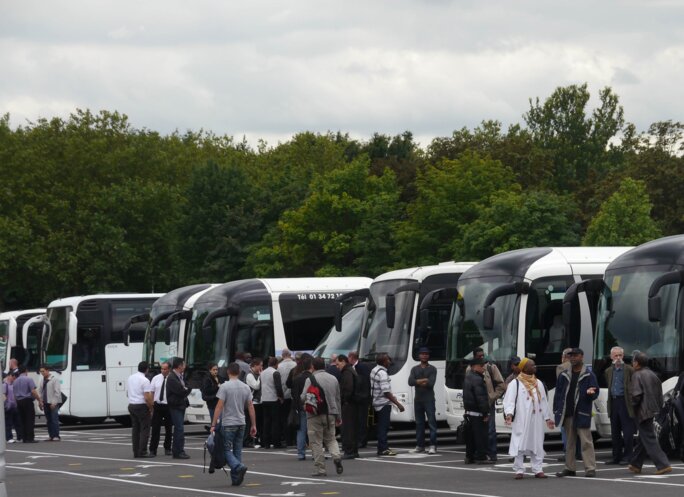
Enlargement : Illustration 8

“It's all pointless,” he says. “They are going to close the factory whatever, they have no choice,” he adds, his words partly drowned by the noise of planes taking off at the nearby airport. Born a few kilometres outside Ankara in Turkey, Ferhat came to France at the age of 14. Two years later he was already working. After a few years of doing various casual jobs his father, who had “worked 36 or 37 years in the paint shop at Peugeot”, got him a job at the Aulnay site. That was 23 years ago.
“I worked all over in the assembly area and afterwards I did training, evaluations and so on. Today I'm an overseer, I have eleven people working for me,” says Ferhat, who has always refused to join any union. “I have a lot of friends in the unions but I'm not a member of any of them. You, you can't see what goes on inside the factory. When people come out they talk, but in there it's different. Quite a lot of people take naps and yet they earn the same salary as me.”
Ferhat is insistent; he is not “Mr Citroën” and doesn't “particularly” defend his company, and he says he finds himself “in the same boat” as his workmates. And yet he's “had enough”. He's had enough of assembly line workers who refuse to work and hold up the entire production line. He's had enough of workers who are on light duties for medical reasons and who “sometimes seem to be pretending”. And he says he's had enough, too, of union representatives who “leave saying they are off to defend us, when I have never seen myself defended”.
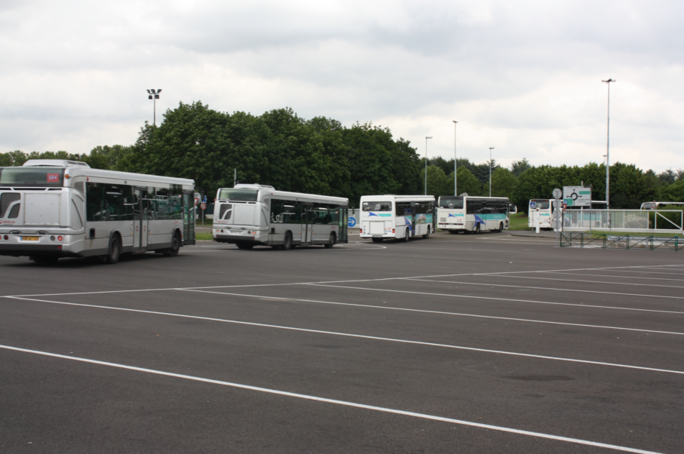
Enlargement : Illustration 9

The morning shift, which get under way at 6.46am, has been particularly difficult, he says. And the fact that some colleagues - “including temporary staff” - refuse to get stuck in hardly helps matters. “The wheel tightening machine broke down,” recalls Ferhat. “So everything had to be done by hand. I had to inspect all the wheel screws, with a weight of 110 kilos on each one.”
But Ferhat doesn't want to complain, he's “got used to it”. Neither the rhythm of the assembly line - “a car every 56 seconds” - nor the noise of the conveyor belt that passes over his head - “it goes clack-clack-clack all day” - nor even the deep uncertainty over the factory's future will make him stop working. “In 23 years I've had one week off sick and I've downed tools just once.”
Ever since the first rumours about the plant's future began to circulate, Ferhat has been looking to leave the Aulnay site, encouraged by his wife who “never stops telling me to leave as quickly as possible”. He explains: “I applied to be moved to [the factory at] Poissy [north-west of Paris] or Saint-Ouen [a northern suburb of Paris] two months ago but I've had no success yet. There are places for assembly line operators but not for overseers. Doing that doesn't interest me, I don't want to go backwards, I want to move up,” he adds. However, Ferhat is convinced the company will find him a position. “The captain is always the last to leave the ship. The overseers will remain here until the closure, then they'll put us somewhere else...”
*His real name has been changed
------------------------------
English version: Patricia Brett and Michael Streeter


